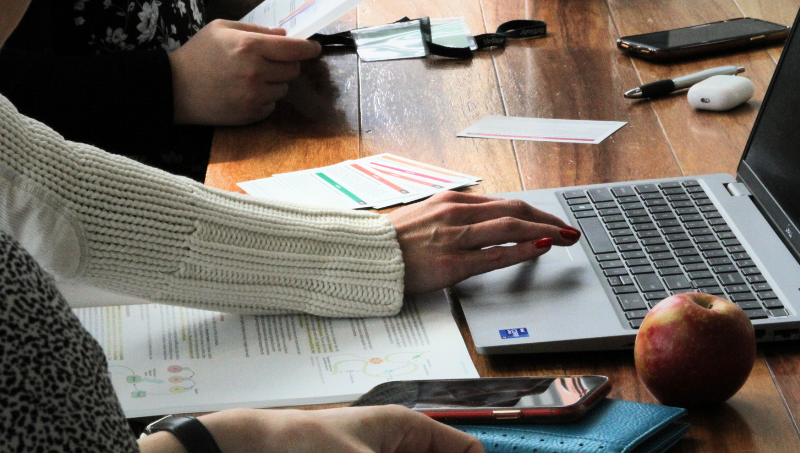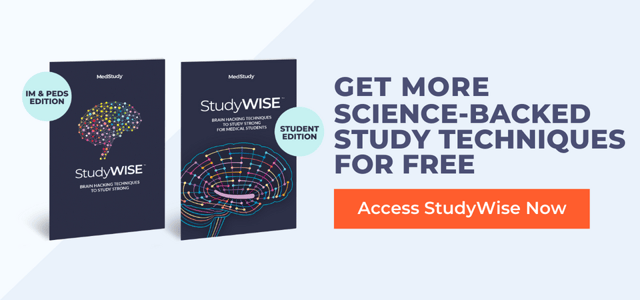
What is Self-Testing?
Self-testing is a learning technique that involves recalling as much of the information as you can to answer a specific question—without looking at the material.
Most doctors prepping for boards use questions for their single study resource or go through practice questions as a way to confirm their mastery of the material. While quizzes that cover an area you have studied extensively are a good way to assess your current knowledge of that area, they can do so much more!
Questions are the ideal presentation of facts, concepts, and processes during all stages of studying—assessing your knowledge of a topic, previewing the material, studying it, and as a means of processing the material into long-term memory. Use questions to check how much you can recall about a concept or process. This lets you evaluate your current knowledge and preps your mind for learning more on that topic.
Of course, you can take Q&As after extensive study to evaluate what you know. But even more importantly, self-testing actually helps lock must-know information into your long-term memory!
Does self-testing improve memory?
Research reveals that learners who practice repeated self-testing perform up to 50% better than those who review or re-read alone.
Educators have always valued testing as an evaluation tool, but it is only in the last 10 years that learning theorists have popularized the notion of testing as a learning tool. Other names for this technique are “test-enhanced learning,” the “testing effect,” or “testing as a learning event.”
What is testing effect?
Self-testing and testing effect are often used interchangeably. Testing effect refers to the finding that using the self-testing technique actually improves long-term memory. It describes the increase in long-term memory that is gained when a learner retrieves information while studying.
How the testing effect makes recall easier
Testing effect says that retrieval is a major form of practice, and that practice of recalling information while you’re studying benefits how you memorize the material. Using self-testing (or testing effect) works more efficiently than studying and re-studying the material, so you’re increasing your study efficiency when using this technique.
Why does self-testing work?
Learning experts theorize that self-testing is beneficial because of the effort that’s involved to retrieve the information.
A key way to capitalize on this benefit is to space out your self-testing session over progressively longer intervals. After you’ve finished studying the material, self-test two days later, then ten days, then six weeks, etc.
What are the benefits of self-testing?
Most everyone underestimates the effectiveness of self-testing as compared with traditional or “elaborate” study methods. So they resist self-testing and instead stick to what they’ve always done, missing out on gains they could be making.
When you cram, or simply re-read material, you can be fooled by “retrieval fluency,” the false sense that you have a greater grasp of the material than you do. This comes from the initial strength of short-term memory—memory that will fade if not reinforced with retrieval practice.
The biggest benefit of self-testing is efficiency. It’s a time saver! The more you self-test, the stronger your memory of the information you will be, and the less you’ll have to study the next time an exam rolls around.
What is spaced retrieval?
Repeated retrieval of a memory progressively spaced out over weeks to months can make that memory easily recalled for years. Purposefully repeating the process of recalling previously learned information is called retrieval practice, and doing retrieval practice on the same material multiple times with progressively longer periods between is called spaced retrieval.
Examples of self-testing activities
You can self-test with almost any material. For studying without dedicated materials, you can draw a concept map or jot down everything you know about the given subject.
Because we understand the power of self-testing, our products are built to support this study technique.
Self-testing with Q&As
Try to answer the question before you check the multiple-choice options. Then, select the single best answer. Read the correct answer and explanation afterward for self-correction and understanding.
Self-testing with flashcards
Think about everything in the scenario and generate your best answer. Read the flip side to check your accuracy.
Self-testing with a course or video review
Go back through the Audience Response Questions after you watch the entire Course or Video Review, and make sure you pause the video before the speaker answers the question!
Our Internal Medicine Video Board Review now comes with Audience Response Questions that really test what you know. You can easily implement spaced retrieval with your board review videos.
Self-testing with Core Books
Go through the Preview | Review Questions in the Core for your self-test. You’ll find the answers in the highlighted text!
Self-testing for CME credits
You can absolutely use self-testing to earn your CME credits or MOC points. In fact, our Q&A banks are some of our most-loved tools for earning CME because it’s so quick and easy! You can earn up to 100 CME credits and MOC points, and you’ll earn 1 point for every 4 questions you answer correctly.
How to improve your self-testing skills
The best way to improve your self-testing skills is to just start! Before you jump into any reading or comprehensive studying, pause to ask yourself questions about the material. And, most importantly, spend some time and effort dredging up all the information you know! That’s where the magic happens.
Learning techniques from MedStudy
There are a variety of evidence-based learning techniques we love that will make your life easier. We build these into our products wherever possible to help make these learning techniques automatic.
If you’re ready to dive into more learning strategies, check out StudyWise. Our founder, Tony Hannaman, MD, goes through everything he has learned from years of researching learning theory, including strategies that will totally change your study routine—self-testing, spaced retrieval, interleaving, and drawing concept maps. And he breaks down how to do it all in three simple steps!



